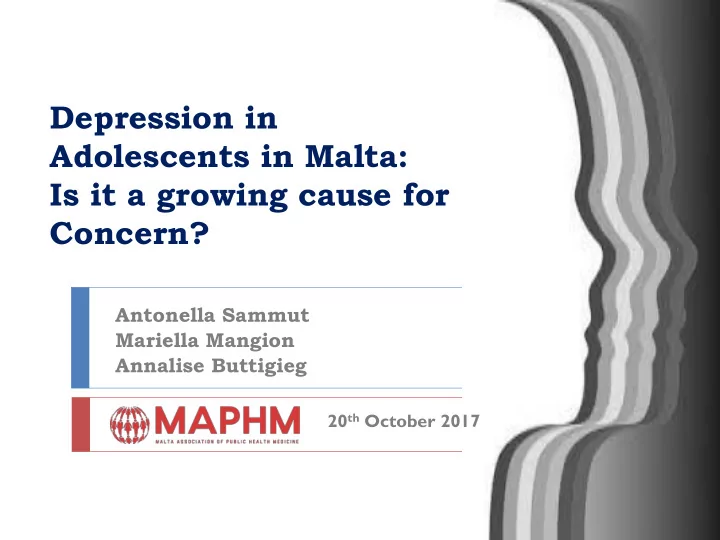

Depression in Adolescents in Malta: Is it a growing cause for Concern? Antonella Sammut Mariella Mangion Annalise Buttigieg 20 th October 2017 #PHSymposium17
Background 50% of mental health illnesses begin before the age of 14 years Onset is common in teens because of the developmental changes; genetic & hormonal influence Internalizing disorders commoner in females and are on the rise Globally depression is the number one cause of illness and disability in young people aged 10 – 19 years Mental health is critical for optimal development Childhood psychiatric disorders have long term social and economic costs Suicide is the second leading cause of death in 15-29-year-olds. #PHSymposium17
Previous studies in Malta • Childhood Depression - Zammit S. • Age 11-13 years • 13.2% 1994 • Depression self rating scales • Investigating the Prevalence of Childhood Depression – Bonello AM • Mean age 9.4 years 2002 • 1.7% • Children’s Depression Inventory #PHSymposium17
Method Study Response Number of Age Year rate (%) participants (years) 2006 91 569 13.6 2010 75.6 406 15.2 2015 72.8 494 14.3 #PHSymposium17
Tools Used • Revised Child Anxiety & Depression Scale • Depression self-rating scale for children 2006 • Centre of Epidemiology Studies – Depression (CES-D) Radcloffe 1977 2010 • Patient Health Questionnaire 9(9PHQ) Kroenke et al., 2001 2015 #PHSymposium17
Prevalence (%) 44.5 27.3 21.3 2006 2010 2015 #PHSymposium17
Depression by gender (%) Female Male 53 37 34 31 16 12 2006 2010 2105 #PHSymposium17
Risk of depression Age Female Victim of Bullying Poor self reported health Pressure to study Supportive family environment #PHSymposium17
Limitations Although studies measured depressive symptomatology, the aims of the study differed thus limiting comparability and associations of depression with specific risk factors The use of different tools and different age groups also limits comparability 2010 study only included state schools and used convenience sampling #PHSymposium17
Comprehensive Intervention Community Resilience School Family Positive Youth Child Development Adolescent #PHSymposium17
Intervention Child/Adolescent Family School Improve Communication coping skills Age Counselling Empower services parents Zero Supportive Girls tolerance to family bullying environment #PHSymposium17
Community Intervention Environment Health sector & Activities Improved awareness Safe environment Healthy community Child/adolescent – centred care activities targeting young Walk-in centres to access timely people ex sports, help centres were adolescents can meet Smooth transition from child to adult care and socialize etc Training GPs in adolescent health #PHSymposium17
Conclusions The prevalence of symptoms of depression in school-aged adolescents in Malta is a cause for concern and calls for immediate action. Comprehensive intervention fosters child resilience and healthy youth development. Mental wellbeing is a key resource for learning, productivity, participation and inclusion. Investing in proactive care to promote, protect and sustain mental health in the population will lead to good financial returns and health gains. Overall impact of mental health promotion and wellbeing of children gives 3x return on investment in 1-5 years. #PHSymposium17
#PHSymposium17
References McDaid D., 2011 Making the long-term economic case for investing in Mental Health to contribute to sustainability from a Health Public Sector Perspective The Prevention of Adolescent Depression Psychiatric Clinics of North America, Volume 34, Issue 1, Pages 35-52 Tracy R.G. Gladstone, William R. Beardslee , Erin E. O’Connor Michael Fendrich M., & WeissmanV., (1990) Screening for depressive disorder in children and adolescents: Validating the center for epidemiologica studies depression scale for children. American Journal of Epidemiology , Volume 131, Issue 3, 1 March 1990, Pages 538 – 551,https://doi.org/10.1093/oxfordjournals.aje.a115529 Lee T., Cheung & C., Kwong W., (2012). Resilience as a positive development construct: A conceptual review. The Scientific World Journal, Vol 2012 Article ID 390450. Kroenk K, MD, 1 Spitzer R, MD, 2 & Williams J., DSW 2 (2001). The PHQ-9 Validity of a Brief Depression Severity Measure. J Gen Intern Med. 2001 Sep; 16(9): 606 – 613. WHO Depression Fact Sheet. http://www.who.int/mediacentre/factsheets/fs369/en/ #PHSymposium17
Thank You
Recommend
More recommend